
How to Use ALTHOUGH, IN SPITE OF & DESPITE Correctly? ESL Forums
Grammar explanation. Although, even though, in spite of and despite are all used to link two contrasting ideas or show that one fact makes the other fact surprising. They can all be used at the beginning or in the middle of the sentence. Despite the rain, we enjoyed the festival. We enjoyed the festival, despite the rain.

Despite vs Although in English Grammar English Study Here
We can use linking words like 'however', 'although' and 'despite' to do this. Although. We can use 'although' at the beginning or in the middle of a sentence. It is used in front of a clause (a clause has at least a subject and a verb that agrees with the subject). Although the weather is bad, I love London. I love London, although the weather.
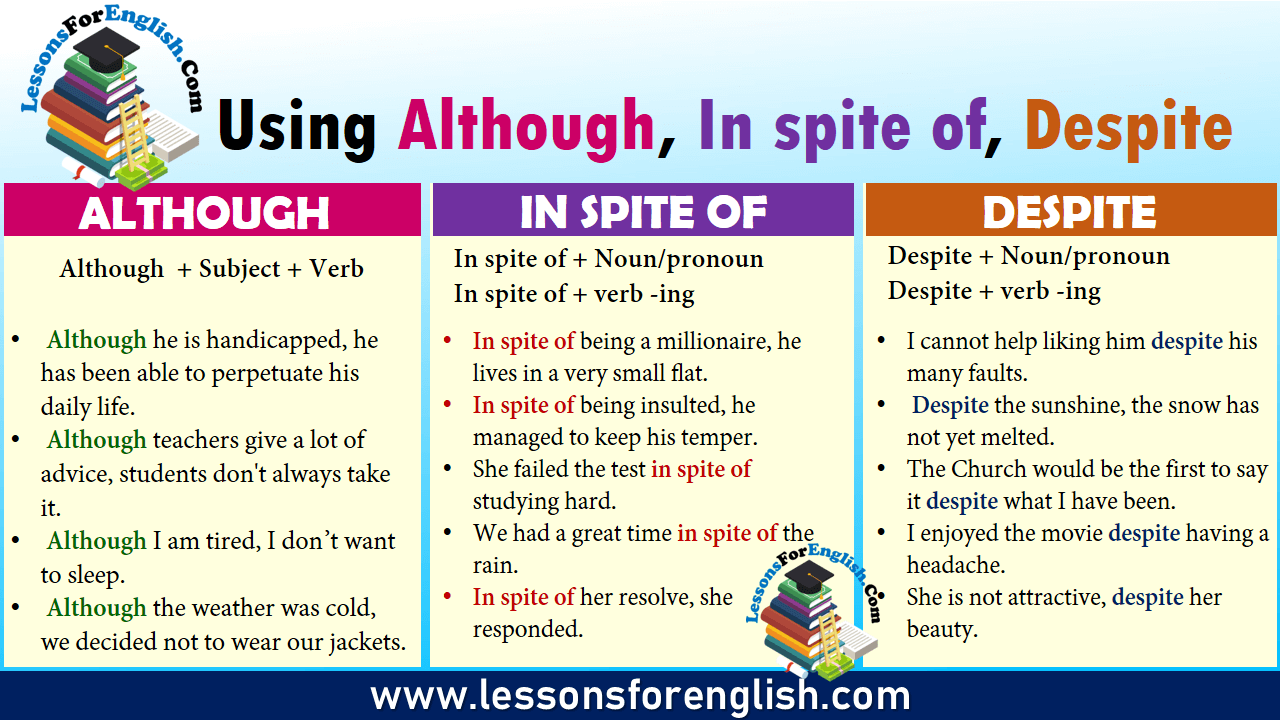
Using Although, In spite of, Despite Lessons For English
Despite has the same meaning as although, which means in spite of the fact or something, used to show a contrast in ideas. But since it is a preposition, it is always used before a pronoun or a noun in a sentence. For example; I was trying hard despite the pain in my chest. We had a good day despite the injury.

Although vs Even though English Study Here
In spite of and despite - English Grammar Today - a reference to written and spoken English grammar and usage - Cambridge Dictionary

Despite vs Although Beautiful words in english, Learn english, Gernal
I didn't use my umbrella. 2. Despite / In spite of + N. Next, explain to your students that despite and in spite of must be followed by a noun or gerund. You can also point out that despite and in spite of have the same meaning, but despite is more commonly used than in spite of. The latter is a little more formal.

Using ALTHOUGH, DESPITE & IN SPITE OF Enseñanza de inglés, Palabras
The examples below show us that although / even though and despite / in spite of are similar in meaning, but are used differently. although, even though. (+ clause) despite, in spite of. (+ verb + -ing) Even though he's a millionaire, he lives in a very small flat. Despite / in spite of being a millionaire, he lives in a very small flat.

Commonly Confused Words 7 English Word Pairs that Confuse Absolutely
Despite and Although are both used to contrast two things, but the difference is in the structure of the sentences. DESPITE Despite is a preposition. Followed by a noun or pronoun. Cannot link clauses. Example Sentences; I love him despite his faults. Despite being much older than the others, he won the race. They went out despite the rain. Despite applying for hundred of jobs, she is still.
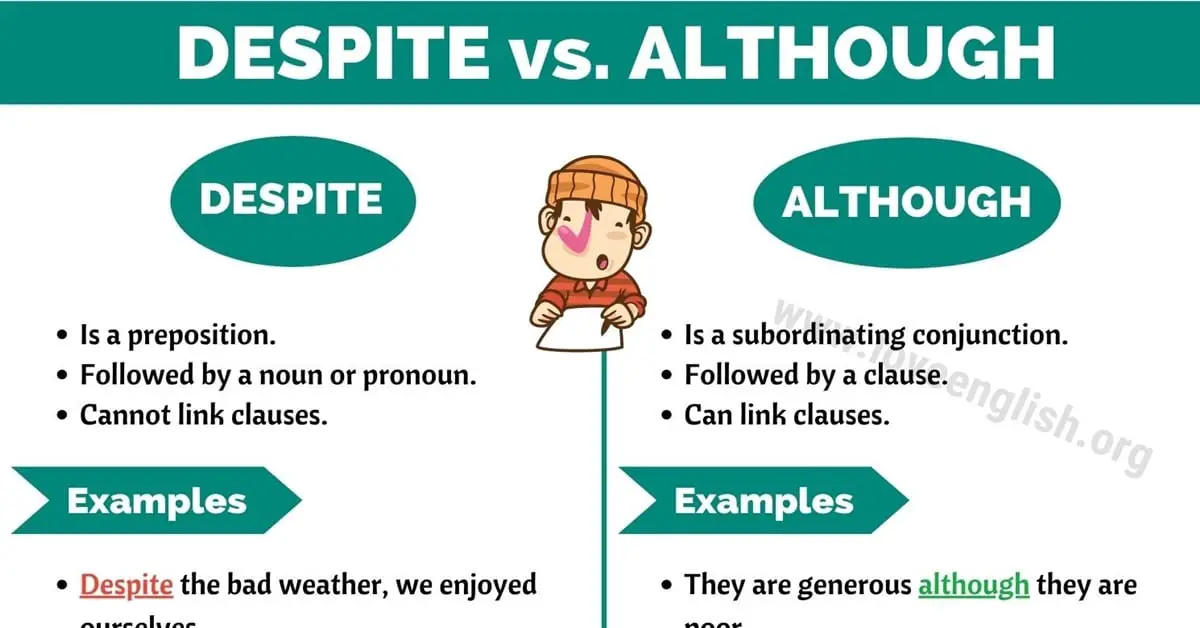
Despite Vs Although How To Use Despite Vs Although Correctly? Love
Comparison Words: Although, Whereas and Despite. Academic writing often involves comparing and contrasting arguments or opinions. There are many words you can use for this, each with their own specific meanings.. However, to ensure your written work is clear and compelling, it's important to pick the right word for the occasion. In this post, we introduce three comparison words you might.

Although In spite of Despite general… English ESL worksheets pdf & doc
2 Answers. 'in spite of', 'despite' and 'although' are all used to show contrast and are used for the same meaning. The only difference is the way they are used; the structure in which they are used. 'in spite of' and 'despite' are placed in front of a noun or pronoun: We had a great time in spite of the rain.

Using Despite, In Spite Of, Although, Even Though, Though
Although/even though and despite/in spite of are used to combine or link two contrasting statements.. ALTHOUGH and EVEN THOUGH are followed by a subject and a verb. Even though is a slightly stronger form of 'although'. Although and though have the same meaning and are interchangeable in most cases. 'Though' is less formal than 'although'. Note: 'Though' can also be used as an.

How to Explain Despite Vs. Although Blog ESL Library
Although he studied very hard, he still didn't pass the exam. If 'in spite of' and 'despite' are used in front of the phrase 'the fact that' then they can be used with a subject and a verb: In spite of the fact that he studied very hard, he still didn't pass the exam. Despite the fact that it rained we still had a great time.
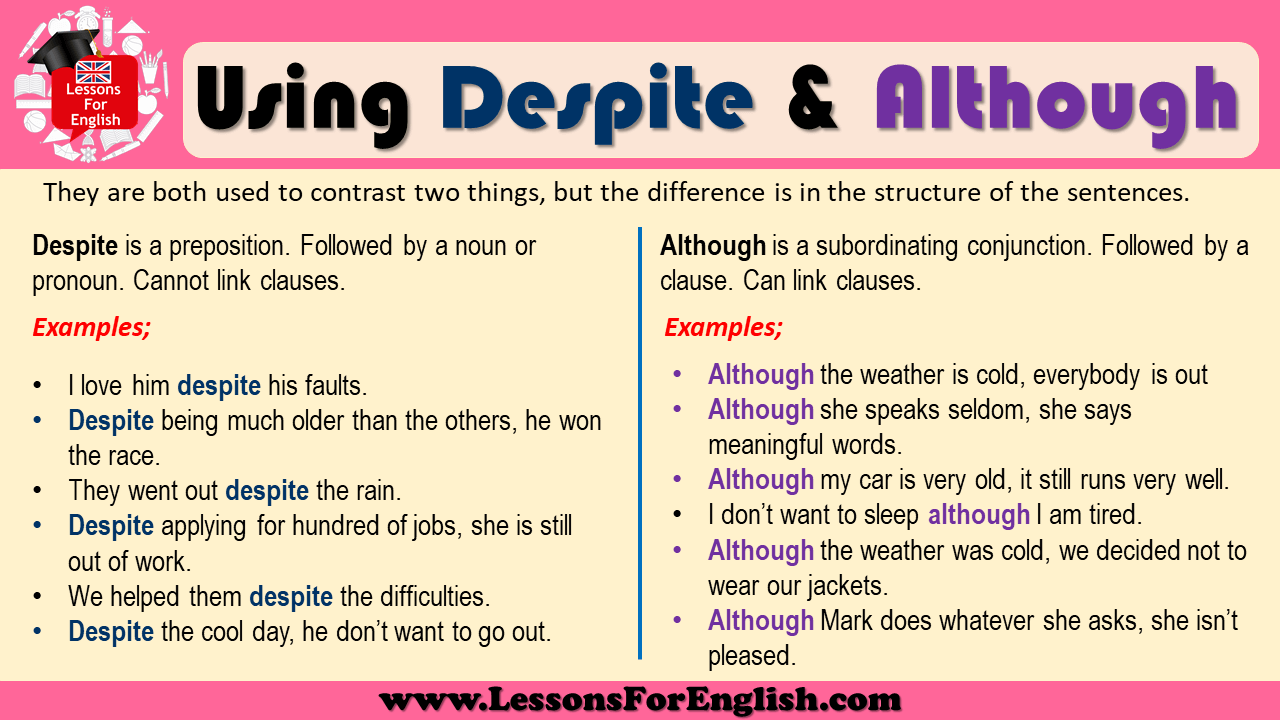
Using Despite and Although Lessons For English
'Despite' as a preposition, a noun, and a verb. The three answers from 2010 pay little or no attention to the fact that despite can function as either a preposition or a noun—although RegDwigнt does cite Etymonline as observing that "The preposition [despite] (early 15c.) is short for in despite of (late 13c.)" In the phrase "in despite of," despite is a noun.

Click on 'ALTHOUGH' vs 'IN SPITE OF'
Despite and although are two commonly used words in the English language that express contrast. Despite is a preposition that means "in spite of" or "without being affected by," while although is a conjunction that means "even though" or "despite the fact that.". Despite is followed by a noun or a pronoun, while although is.
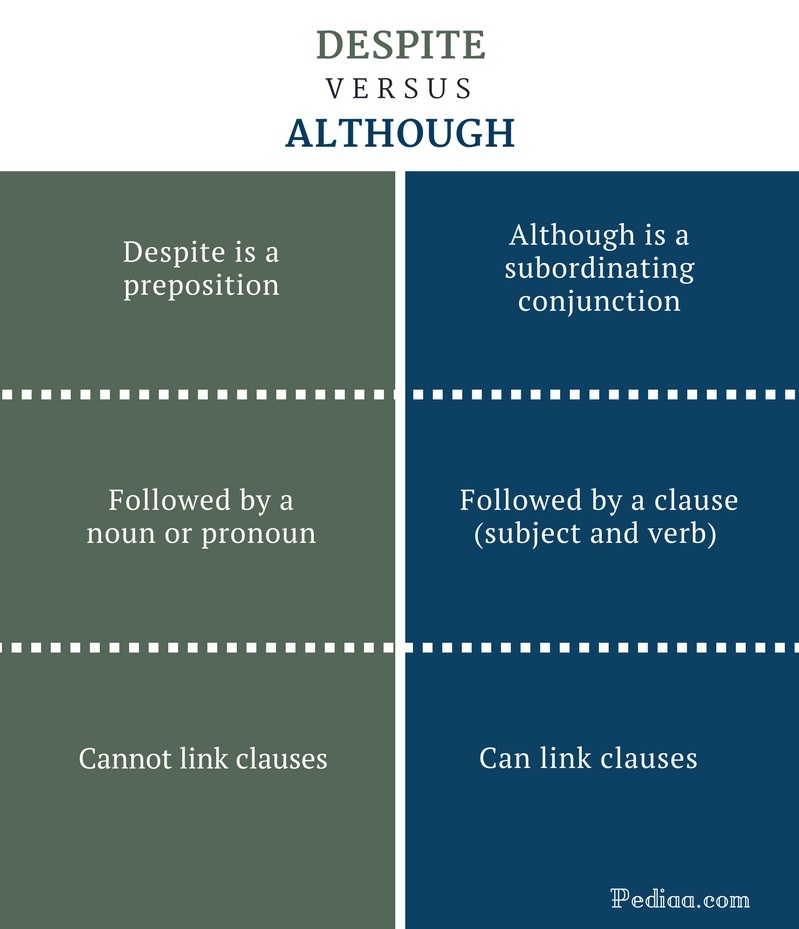
Difference Between Despite and Although Learn English Grammar and
In this lesson, take a look the tricky conjunctions although, even though, despite and in spite. Find out more about their meanings and when to use them. Although and even though.
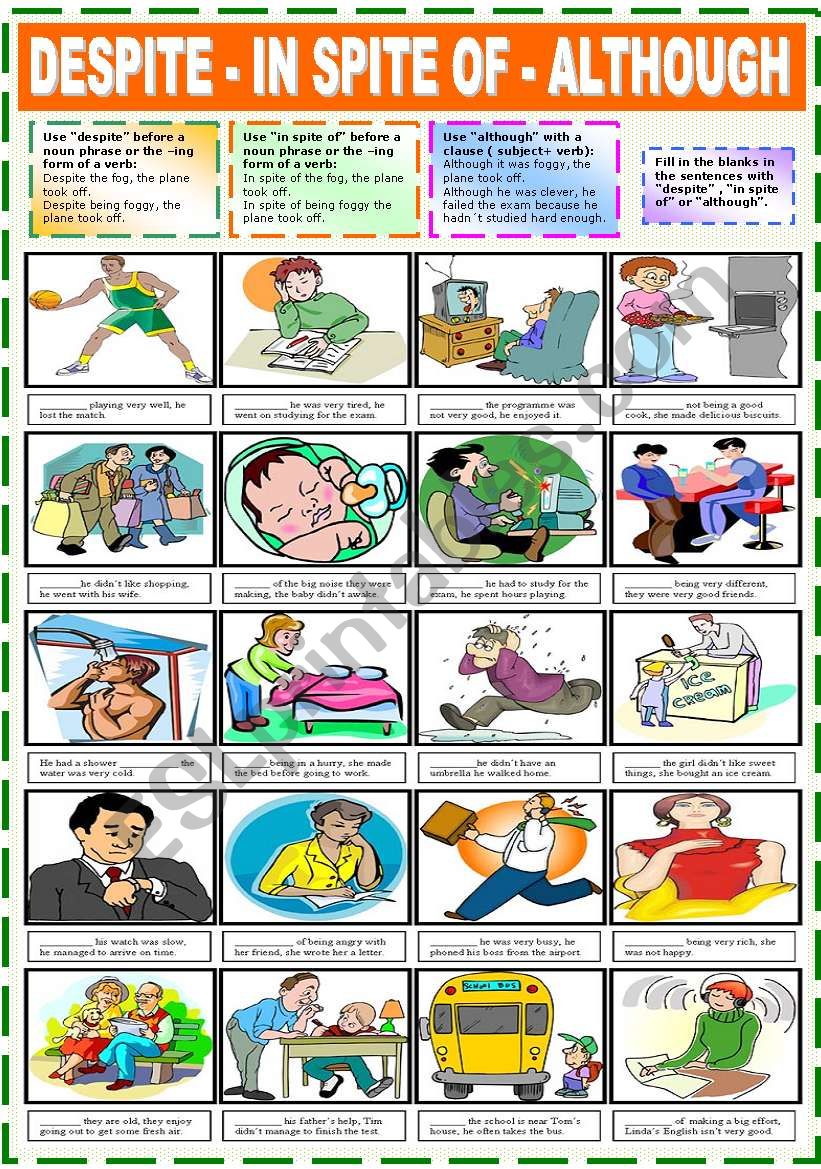
DESPITE IN SPITE OF ALTHOUGH ESL worksheet by Katiana
In spite of / despite the fact that. Sometimes we use the phrase "the fact that" after in spite of and despite. This does not change the meaning but does change the grammar. After "despite/in spite of the fact that" we must use a subject + verb. Look at these examples: Jim went for a walk despite the fact that it was raining.
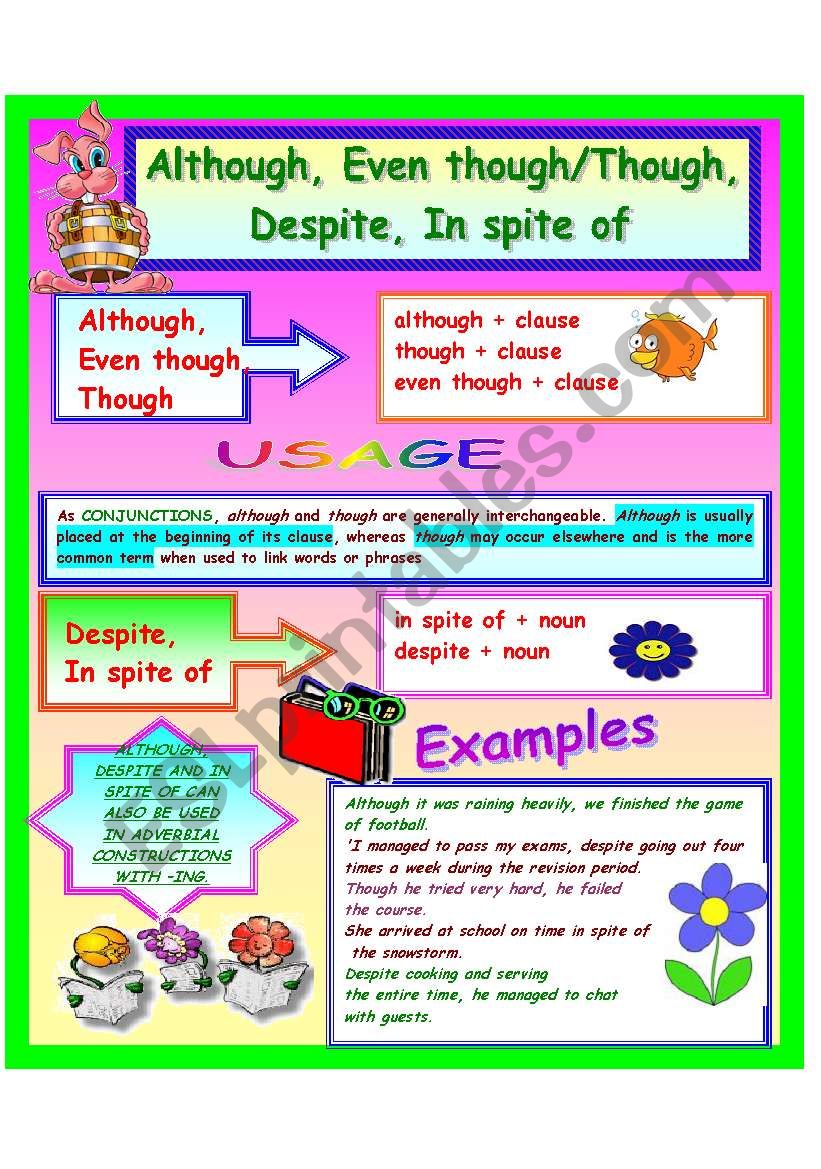
ベストオブ Despite In Spite Of
Although. The word 'although' is a conjunction used to show that something is surprising or unexpected under the circumstances. For example: Although Jane was a good student, she hasn't found a job yet. The 'although' here mean 'despite the fact that'. The surprise in this case is because we expect good students to find work.